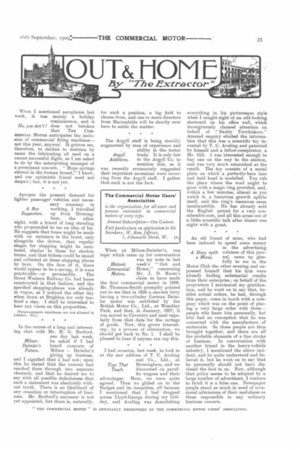When I mentioned aeroplanes last week, it was merely a
Page 13

If you've noticed an error in this article please click here to report it so we can fix it.
holiday reminiscence, and it No, you don't I does not betoken
that Tax ComStERCIAL MOTOR anticipates the inclusion of commercial flying machines— not this year, anyway. It grieves me, therefore, t42.• decline to mention by name the lubricating oil used on a recent successful flight, as I am asked to do by the enterprising manager of a prominent concern. "Hope springs eternal in the human breast,' I know, and our optimistic friend need not despair ; but, it is not yet.
Apropos the present demand for lighter passenger vehicles and neces sary economy in A Bus working, I travelled Suggestion, up from Birmingham, the other night, with a friend of long standing who propounded to me an idea of his. He suggests that buses might be made with an entrance in the front, only alongside the driver, that regular stages for stopping might be instituted, similar to those for electric trams, and that tickets could be issued and collected at these stopping places by boys. On the face of it, there would appear to be a saving, if it were practicable--or permissible. The Great Western Railway Co. had buses constructed in that fashion, and the specified stopping-places are already in vogue, as I noticed the other day when down at Brighton for only toobrief a stay. I shall be interested to hear any views on this proposition.
(Front-entranee omnibuses are not allowed in Loodon.—End
In the course of a Icing and interesting chat with Mr. H. G. Burford, one day last week, Mineshe asked if I had Daimler's heard rumours of Future. Milnes Daimler's giving up business, and I signified that I had not; upon this he stated that the rumour had reached them through two separate channels, and that he desired me to say with all possible definiteness that such a statement was absolutely without truth. There is no likelihood of any cessation or interruption of business. Mr. Burford's successor is not yet appointed, but there is, naturally, for such a position, a big field to choose from, and one or more directors from Marienfelde will be shortly over here to settle the matter.
The Argyll staff is being steadily augmented by men of experience and ability in the motor Argyll trade. It is only fair Additions. to the Argyll Co. to mention this, as it was recently erroneously suggested that important secessions were occurring from the Argyll staff. I gather that such is not the fact.
When at Milnes-Daimler's, on topic which came up for conversation was my note in last Historic week's "Out and Commercial Home," concerning Motors. Mr. J. D. Roots's claim to have made the first commercial motor in 1898. Mr. Thomson-Smith promptly pointed out to me that in 1896 a one-ton lorry having a two-cylinder German Daimler motor was exhibited by the British Motor Co., Ltd., at Wembley Park, and that, in January, 1897, it was moved to Coventry and used regularly from that date for the cartage of goods. Now, this grows interesting; by a process of elimination, we should get back to No. 1. I shall be pleased to hear if anyone can cap this.
I had occasion, last week, to look in at the new address of T. C. Aveling and Co., Ltd., at Toys That Birmingham, and we
Teach. discoursed on paraffin wagons and their advantages. Here, we were quite agreed. Then we glided on to the Budget and its inequities, all because I mentioned that I had dropped across Lloyd-George during my holiday, and Aveling was demolishing
everything in his picturesque style when I caught sight of an odd-looking showcard on his office wall, which incongruously claimed attention on behalf of "Daddy Tinwhiskers." Amazed enquiry elicited the information that this was a scientific toy invented by T. C. Aveling and patented by himself and a fellow-conspirator, a Mr. Gill. I was interested enough to buy one on the way to the station, and was very much astonished at the result. The toy consists of a metal plate on which a perfectly-bare face and bald head is modelled. You rub the place where the wool ought to grow with a magic ring provided, and, within a few minutes, almost as you watch it, a luxurious growth uplifts itself, and the ring's resources seem inexhaustible. He has already sold the English patent for a very considerable sum, and all this arose out of a little scientific talk after dinner one night with a guest.
An old friend of mine, who had been induced to spend some money in the advertising columns of this journal, came up gleefully to me in the Motor Club the other evening and expressed himself that his firm were already finding substantial results from their enterprise; on behalf of the proprietors I murmured my gratification, and he went on to say that, besides actual orders, he had, through this paper, come in touch with a company which was on the point of placing a very large order with them— people who knew him personally, but who had no conception that he was connected with the manufacture of motorcabs. So these people are thus brought together, and there are all the probable elements of a fine stroke of business. In conversation with another friend in the heavy-vehicle industry, I mentioned the above incident, and he quite understood and believed it, but he went on to say that he personally should not have disclosed the fact to us. Now, although that policy seems to be adopted by a large number of advertisers, I venture to think it is a false one. Newspaper people stand as much in need of occasional admissions of their usefulness as those responsible in any ordinary business concern.
A Story 'with a Moral.




















